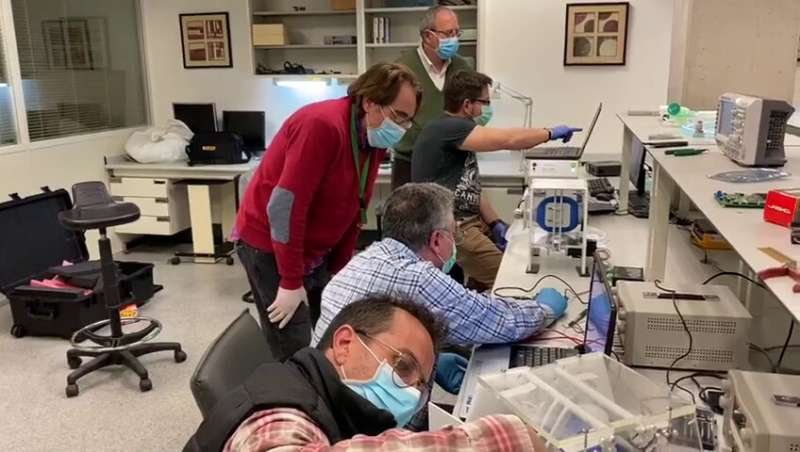Credit: Asociación RUVID
Valencia's Polytechnic University (UPV) has headed the development of a new mechanical ventilator, which is ready to be manufactured on an industrial level, in turn helping supply these devices to hospitals where they can help patients affected by COVID-19.
Alongside the team of the UPV, researchers from the Biomechanics Institute (IBV) and the AIDIMME Technological Institute have taken part. Furthermore, experts in respiratory mechanical ventilation technology have also participated, specifically Dr. Daniel Navajas and Dr. Ramón Farré, from the Network of Biomedical Research Centre for Respiratory Diseases (CIBERES) – Barcelona University, and Dr. Rafael Badenes, Head of the Anaesthesiology and Reanimation department of the Hospital Clinic Universitari de València—Valencia University.
Respiratory insufficiency is one of the symptoms linked to COVID-19. It is believed that between 3 and 7% of people infected with the virus will require mechanical ventilation systems. "With the incidence of this pandemic, our health system can become overwhelmed. Our work wants to contribute to the number of ventilators available in our hospitals. The equipment has been validated in the lab and is ready to be produced in mass, after obtaining the permit of the Spanish Medicines and Health Products Agency," says Javier Saiz, head of the Centre for Research and Innovation in Bioengineering (Ci2B) of the UPV and coordinator of the work team that has developed the ventilator.
Developed in just 10 days
The ventilator has been developed in just 10 days. It consists of a controlled electrical-mechanical device that will maintain the respiratory cycle of critical patients. It stands out due to its simplicity, easy handling and small size. "Furthermore, it's design facilitates a fast and simple manufacturing for companies," adds Carlos Atienza, head of innovation of Health Technology from the Biomechanics Institute (IBV) and coordinator of the mechanical development of the ventilator. The design and manufacturing of the two first prototypes was conducted in record time, five days, by the technical team of the IBV comprised by José Navarro, Fernando Molla and Daniel Gómez, and of the Ci2B, Julio Gomis-Tena and Alberto Hernández, with the collaboration of professors from the department of Mechanical and Materials Engineering (DIMM) of the UPV, headed by Eugenio Giner.
The system will allow health staff to control the frequency of the respiratory cycle, the volume of air and its pressure. Furthermore, it has different sensors and alarms that help maintain an adequate control of the patients' breathing. In the opinion of the project's experts, "it fully meets the requirements for maintaining the breathing of a critical patient," stresses Javier Saiz.
For its validation, the team coordinated by the UPV worked with the Virtual Hospital of Valencia's Catholic University (UCV), who provided a simulator that can replicate the physiological conditions of a patient with COVID-19 (ASL 5000 of company Medical Simulator).
Companies ready to produce it in mass
After being validated in the laboratories of the Polytechnic City of Innovation, scientific park of the UPV, a large number of companies showed their willingness to manufacture it in mass.
The Company Confederation of the Valencian Community (CEV), with the support of entities integrated within it, such as the Automotive Cluster of the Valencian Community (AVIA), is coordinating companies ready to execute the ventilator's mass production.
Thus, the UPV has the backing of different Valencian companies from the automotive sector such as Agfra, CLR, Itera, Nutai and IT8, as well as from the metal-mechanic sector and others, such as Factor, Rodytrans and Celestica, who are providing their knowledge in manufacturing processes, material selection and the preparation of the chain of supply, in order to ultimately manufacture them and assemble them on an industrial level, in addition to other companies that have expressed interest in taking part, such as Power Electronics or IR Technology, among others.
Provided by Asociacion RUVID
























